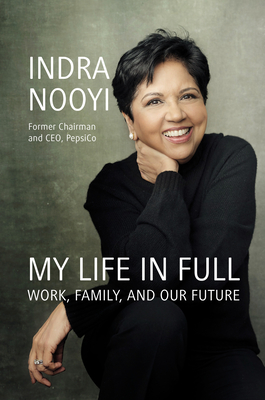
My Life in Full: Work, Family, and Our Future
Indra Nooyi
Questions & Answers
Indra Nooyi balances a successful career and family life by prioritizing, seeking support, and maintaining flexibility. She emphasizes the importance of a supportive spouse, friends, and a company culture that values work-life balance. Nooyi's experiences highlight the need for systemic changes, such as paid leave, flexibility, and accessible childcare, to support both men and women in achieving work-family harmony. Her lessons for professionals include:
- Seek Support: Build a strong support system of family, friends, and colleagues who understand and respect your work-life balance needs.
- Prioritize: Make informed decisions about your career and personal life, balancing short-term and long-term goals.
- Advocate for Change: Push for systemic changes in the workplace and society to support work-family balance for all.
- Embrace Flexibility: Be open to different work arrangements and career pauses to accommodate family needs.
- Lead by Example: As a leader, demonstrate the importance of work-life balance and support others in achieving it.
The gender gap in leadership positions stems from systemic biases, societal expectations, and organizational practices. Key factors include:
- Stereotypes and Bias: Stereotypes about women's abilities and leadership styles can lead to hiring and promotion biases.
- Work-Life Balance: Societal expectations often favor men in leadership roles, while women face challenges balancing career and family.
- Lack of Representation: Women are underrepresented in leadership positions, leading to fewer role models and networking opportunities.
- Cultural and Social Norms: Cultural expectations can limit women's access to leadership roles and professional development.
To address these issues, organizations and society can:
- Implement Diverse Hiring Practices: Use blind recruitment processes and focus on skills and potential over gender.
- Promote Work-Life Balance: Offer flexible work arrangements, paid parental leave, and support systems for caregivers.
- Develop Leadership Programs: Create programs that support women's leadership development and provide mentorship opportunities.
- Encourage Cultural Change: Promote gender equality in education, media, and public discourse to challenge traditional norms.
- Measure and Report Progress: Regularly assess diversity and inclusion metrics and hold leaders accountable for progress.
Indra Nooyi's background in a traditional Indian Brahmin family shaped her leadership style and business approach. Her upbringing emphasized respect, education, and discipline, which she incorporated into her professional life. Her respect for authority and education led to a strong work ethic and a focus on continuous learning. Her family's modest lifestyle taught her resourcefulness and the value of hard work.
Nooyi's unique perspective can be learned in several ways:
-
Inclusivity: Her diverse background and experience have made her a proponent of inclusivity in the workplace. She believes in bringing different perspectives to the table, which leads to better decision-making and innovation.
-
Balancing Work and Family: Nooyi's experience as a working mother has given her insights into the challenges of balancing work and family life. She advocates for policies that support working parents and recognizes the importance of a supportive care ecosystem.
-
Global Mindset: Her international experience has equipped her with a global perspective, allowing her to navigate and succeed in diverse markets and cultures.
-
Respect for Tradition and Innovation: Nooyi respects her cultural heritage while embracing innovation and change. This balance has allowed her to lead companies like PepsiCo through significant transformations.
-
Empathy and Compassion: Her upbringing instilled empathy and compassion, which she has used to connect with employees, customers, and stakeholders, fostering a positive and supportive work environment.
Indra Nooyi's tenure at PepsiCo exemplifies several effective strategies for creating a sustainable and contemporary organization:
-
Performance with Purpose (PwP): This approach integrates social responsibility into business goals, focusing on nourishing humanity, replenishing the environment, and cherishing people. This strategy can be applied to other industries by aligning business objectives with societal needs, fostering innovation, and prioritizing long-term sustainability.
-
Employee Empowerment: Nooyi emphasized the importance of a supportive and empowering workplace. This includes diversity, inclusion, and providing benefits like childcare, which can improve employee satisfaction and retention.
-
Innovation: Nooyi's focus on evolving the product portfolio towards healthier options and sustainable practices demonstrates the power of innovation in adapting to changing consumer demands and environmental concerns.
-
Global Perspective: Nooyi's global experience and focus on international markets highlight the importance of understanding diverse markets and consumers, which can be crucial for companies looking to expand their reach.
-
Strategic Leadership: Nooyi's ability to set ambitious goals and lead with vision and determination is key. This involves clear communication, strategic planning, and the ability to navigate complex challenges.
Applying these principles to other industries involves integrating social responsibility into business models, fostering a culture of innovation and inclusivity, and developing strategic leadership that can navigate global markets and adapt to changing environments.
To improve work-family balance policies, the U.S. and other countries should focus on three key areas: paid leave, flexibility and predictability, and care. Governments should mandate paid maternity and paternity leave, encourage flexible work arrangements, and invest in childcare infrastructure. Businesses can offer flexible work options, on-site childcare, and support for employees' personal lives. Communities can foster supportive networks and advocate for policy changes.
Governments should implement paid leave policies, ensuring all employees, including federal workers, have access to paid time off after the birth of a child. Businesses can adopt flexible work schedules, remote work options, and support systems for employees with caregiving responsibilities. Communities can create accessible childcare options, support networks for families, and advocate for policies that support work-family balance. Together, these efforts can create a more supportive environment for working families.